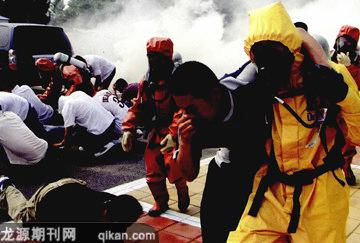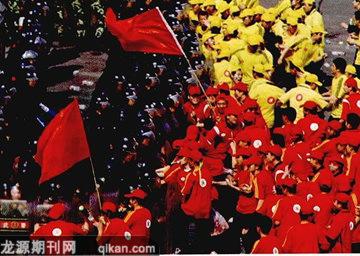Ensuring Olympic Security
By staff reporter ZHANG XIWEN

BEIJING, already a comparatively secure city, has taken special measures to ensure a safe Olympics. About four years ago, the Beijing Olympic Security Coordination Group was set up to establish a national command system involving the police, army and armed police, as well as security companies and volunteers. Since January 12 this year, security work has shifted from the planning to the implementation stages across the capital. “We have drawn up 546 detailed plans regarding security at Olympic venues, counterterrorism, intelligence, and the guarding of VIPs,” says Liu Shaowu, director of the BOCOG security department.
Protecting Olympic Venues with
Technology
Last August, in routine checks before the Olympic test events held in Shunyi Olympic Rowing-Canoeing Park, 40 frogmen carrying detectors rapidly scanned the two-square-kilometer waterway. Over 100 sniffer dogs led by security inspectors combed every inch of the parks lawn. In August and September, the venue will host the rowing, canoeing (flatwater), slalom and marathon swimming events, representing 32 and four Olympic and Paralympic competitions, respectively.
The 7.8-kilometer-long Olympic Boulevard linking the park to the Jing-cheng Expressway is monitored by electronic eyes, and traffic police will be on duty at every intersection. Every Olympic site is replete with similar monitoring systems to ensure security both inside and outside the venues.
The Beijing Olympic Security Command Center is employing advanced technologies to carry out anti-riot measures and security checks. Over 7,000 pieces of equipment have been installed in Olympic venues alone. “During the Beijing Olympics, we will use all technical means to carry out all-round security checks on personnel, goods, vehicles and sites,” says Liu Shaowu. “We hope for a ‘safe Olympics, but this doesnt mean the Games will proceed under a solemn atmosphere; on the contrary, there will be no obviously heavily guarded scenes, and the tone will be joyous and auspicious. We will make great efforts to effectively hide security as required by the International Olympic Committee.”

Anti-terrorism, Anti-riot and
Emergency
Response Measures
On New Years Day this year, policemen with eight sniffer dogs searched for combustible and explosive goods on Beijings metro as part of an Olympic-related anti-terrorism and anti-riot exercise. “We have given priority to enhancing counterterrorism, anti-riot and emergency response measures since 2004, training anti-terrorism professionals and organizing drills across the city,” explains Ma Zhenchuan, general commander of the Beijing Olympic Security Command Center.
The Beijing SWAT (Special Weapons and Tactics) Unit, also known as the Beijing Special Police Force, was unveiled three years ago, to deal with incidents beyond the capabilities of normal patrol officers, including hostage situations, bomb attacks and riots. The unit, reputed to be one of the best-equipped and most well-trained in China, has been entrusted with many of the security responsibilities for the 2008 Summer Olympics. “Although there have been no terrorist attacks in Beijing, this elite force is able to handle all kinds of emergencies at any moment,” says Liu Shaowu.

In addition, 33 experts from 16 major departments have formed a “counterterrorism brains trust,” to coordinate departments concerned with responding to unexpected events. The security department of BOCOG has also formulated corresponding strategies and measures to handle extreme scenarios and accidents, including serious natural calamities, food safety violations, and major communication breakdowns.
Moreover, the security department has intensified international cooperation, set up an international police affairs liaison department, and invited foreign security experts to Beijing. The department has cooperated not only with the United States FBI in personnel exchange and training, but has also signed a memorandum of cooperation with Greece to draw on that countrys experiences relating to Olympic security. “We have constantly extended safety cooperation and keep improving security levels and technical standards,” says Liu Shaowu.
A Solid Foundation for Public Security
“Ensuring nationwide security is the responsibility of Chinas traditional police service, and the countrys safety foundation is comparatively sound,” claims Liu Shaowu. Ma Zhenchuan adds, “Ordinary people will be the powerful backbone of security guarantees during the Beijing Olympics.”
During the Games, the capital will be secured by no less than 80,000 personnel, plus half a million volunteers cooperating with police. Among them, 300,000 volunteers from local communities will take charge of street patrols and the monitoring of illegal activities. In addition, 30,000 security guards will be assisting police, and 100,000 of Beijings floating population will become volunteers to maintain order. Police will also join hands with neighborhood committees to weed out hidden troubles. “If each local community is secure, then the whole city will be free of hidden dangers,” says Ma Zhenchuan confidently.

How Was the Date for the Olympic Opening Ceremony Chosen?
In China, the number eight is always regarded as auspicious, so it would be easy to associate the date of the Olympic opening ceremony – 8 p.m. on August 8, 2008 – with an infatuation with the number. In fact, it is all just a coincidence.
According to the initial plan, the Games were to be held between July 25 and August 10. The weather bureau, taking into account that the rainy season in Beijing falls from late July to early August, suggested to the Beijing Organizing Committee for the XXIX Olympiad (BOCOG) that the Games be put off to August 15 to 31.
On Aug. 29, 2002, Gilbert Felli, the IOC executive director, said that the postponement could be discussed, but given that many sporting events in Europe are held in August, the Games could only be postponed by two weeks. Acting on a request from BOCOG, the weather bureau provided reams of climate data and research reports on Beijings summer weather. BOCOG put forward the alteration to the IOC in December 2002.
After consulting international sports federations, the IOC officially confirmed to BOCOG in July 2003 that the opening of the 2008 Olympics would be set for August 8, 2008.
More coincidentally, the day before the opening ceremony is the Qixi Festival (which falls on the seventh day of the seventh month, according to the Chinese lunar calendar). The festival stems from an ancient love legend, and is accordingly called the Chinese Valentines Day.
According to the legend, once upon a time, Niu Lang, a young man, lived with his elder brother and sister-in-law, who mistreated him. One day his sister-in-law gave Niu Lang nine cows and sent him to pasture, telling him not to return without 10 cows. Distressed, Niu Lang came across an old man, who told him that there was a sick cow deep in the mountains. “Go find it and take care of it, then you can go home with 10 cows!”
Niu Lang did as told and returned home. The sister-in-law still treated him very badly. One day, the cow Niu Lang once took care of told him that seven fairies went to a lake at the foot of an eastern hill and took a bath every sunset. Doing as the cow told him, Niu Lang stole the clothes of one fairy, Zhi Nü, who could no longer return to heaven, but had to stay and marry Niu Lang.
The couple lived a happy life on Earth and had a son and daughter. But the fairys mother took her back to heaven. Niu Lang chased after them to get his wife back. When he had almost caught up, the mother placed a river, the Milky Way, between them. The couple was then separated forever.
Moved by their devoted love, thousands of magpies, lucky birds in China, bridged the river to make way for their reunion on every seventh day of the seventh lunar month. In ancient China, women would go out under the stars on the evening of that day to pray to have fine needlework skills and a good marriage, facing toward the Niu Lang Star and Zhi Nü Star.
The legend has been passed down from generation to generation and is widely known in China. Many movies, dramas and publications are based on it. May Niu Lang and Zhi Nü be a blessing for us from heaven on the eve of the Olympic Games.

